June 15, 2010
Pesticides And Fruit

everything tastes better with Coke
I.
This is how it works.
They write a study about a link between pesticides and ADHD. I observe that the link isn't the point; the point is to provide another half inch to the stack of "studies about ADHD" so you never question the diagnosis itself.
But there's an unfortunate result of that debate: because I've gone "the extra step"-- gone meta, if you prefer-- you don't think there are any other steps to go.
So you don't think about the pesticides. Because the focus is now on ADHD-- whether the link is real, or whether it's a different syndrome-- you are lulled into false security if your kid doesn't have ADHD. "Phew, I guess the pesticides don't affect him."
II.
In the comments someone had asked: What about a gene that mediates a link between organophosphates and ADHD? A gene that makes you more sensitive to pesticides? That would explain the heritability of ADHD too, wouldn't it?
The NTE gene exists in two copies. If you're lacking both copies of the NTE gene, you're dead. If you lack one copy, you get a 40% reduction in the NTE enzyme (made by the gene). According to this study, deficiencies of this enzyme make mice more sensitive to organophosphates-- it makes them hyper and distractible.
But it matters what you call things. If this were true, then it is only saying that some people (who have deficiency of the enzyme) are more sensitive to organophosphate toxicity. You could even go so far as to say that those symptoms look exactly like ADHD-- but they're not ADHD, they are still pesticide poisoning. You would actually have to go back and say that some kids were misdiagnosed as having ADHD, but they really had pesticide poisoning.
As a techincal issue, lacking this gene/enzyme wouldn't cause an increase in pesticide metabolites in the urine, i.e. lacking the gene wouldn't cause a greater exposure to pesticides, which is what the Pediatrics study detected.
III.
What should we do? Wash our fruits?
This is a meta-analysis of studies of various produce preparation techniques on levels of pesticides. The R* is the percentage of pesticide left on the fruit, e.g. frying removed 90% of the residue.
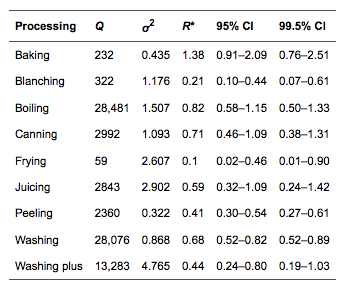
Baking made the concentration of pesticides go up because of water loss; but much of the pesticides themselves could also have been burned off. So feel free to bake.
Peeling is the best method. The skins of many fruits contain high concentrations of nutrients, but they're simply not worth pesticide exposure.
Washing does not help. Even though it looks like washing helps, most people don't wash their genitals as well as they washed these fruits: soaking in a bucket of water for 5-20min; using acetic acid or ethanol washes; multiple washes with a lot of water; combinations of all of those. And that still didn't do much. If thunderstorms don't wash away pesticides, why would five seconds under the tap? (one, two, three, four, five.)
IV.
The study followed 23 kids over a year, letting them live their crazy lives. But for two non-consecutive weeks, they substituted organic produce:
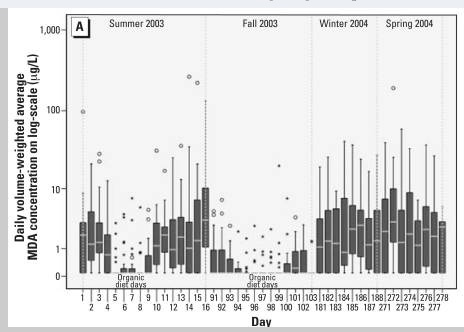
There are a million other pesticide studies I could have used to show the difference between organic and ordinary produce, but I chose this one to make a different point: you have been lied to so many times, now you are being lied to by yourself.
There is a nearly 100% likelihood that you are looking at this chart the wrong way. You are probably saying, "hmm, I wonder what it was on days 95-100 that reduced their pesticide exposure?" What you should be asking-- and it is not the same thing at all-- is "hmm, I wonder what was going on in days 1-5, 9-93, 180-278 that exposed these kids to such high levels of pesticides?" Normal is NO pesticides. But you've allowed "common" to be replaced with "acceptable."
So let's look at the results here:
1. on the days they got organics, they had minimal exposure to pesticides-- this means that everything else in their life (outside, inside) did not really contribute to their exposure, it was almost all due to produce.
2. better illustrated by a reworking of the above graph:
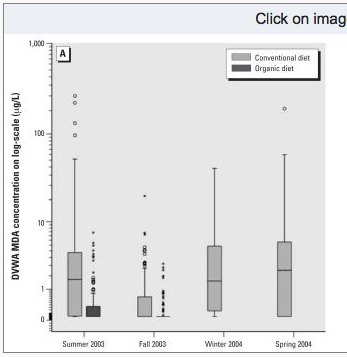
there was a seasonal effect-- Winter and Spring had higher OP exposure than fall (and summer.) What's different in the winter and spring? We don't have American produce to eat, what with their EPA controlled pesticide levels. The supermarkets stock the South American produce where, apparently, they have super bugs that can only be killed by plutonium mist.
V.
There is no easy way to present this data, but trust me: it's worth it.
This study looked at pesticide concentrations in fruit based soft drinks, e.g. made by Coca Cola, across the world. The same product, in different countries, has different pesticide levels. Here's one:
Likelihood Of Winning The World Cup
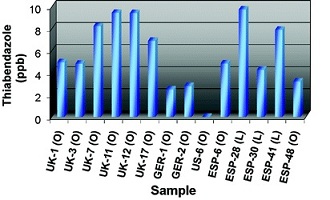 O= Orange drink, L= lemon drink.
O= Orange drink, L= lemon drink.1. Depending on which country you're in, you get more or less pesticide. Take that, you Limey bastards.
2. U.S. not shown? Because there are no fruit juices in our fruit juice soft drinks: all artificial flavoring. Yay chemicals!
3. This is only one pesticide. Toxicity to multiple pesticides is not just additive, but synergistic.
4. The max EU standard is 0.1 ppb. That's zero point one. Take that you Fanta drinking scurvy preventing Limey bastards. Should've stuck to rum.
Vb.
Thus, we can make a graph:
This Is Where You Don't Want To Live
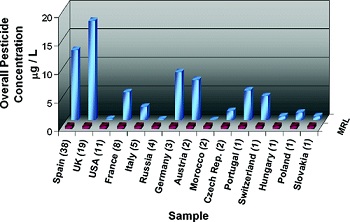
See those small purple bars? They represent the EU max, 0.5ug/L. NB: again, U.S. is low not because we care, but because we don't care.
How do you get that much pesticide into a drink with only 5% juice? See II and III above: they get their lemons and oranges from countries with lax pesticide standards, and they don't peel them.
Vc. How can they get away with that? Answer: using words!
The EU max standards, above, are for drinking water. The max standards for fruit are much, much higher, which means this is ok by fruit standards.
You may not think that a 5% fruit soda by Coca Cola is a fruit, but it is.
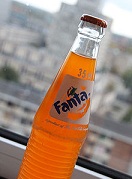 someone tell me how to peel this bitch
someone tell me how to peel this bitchVd.
I looked for Coca Cola fruit sodas that were tested in the U.S., and found 3-- each had 3% fruit juice. None of them had any detected farm pesticides-- likely due to the use of American lemons and oranges (thanks, farm subsidies.)
However, they did all have 0.4, 0.5, and 0.7 ug/L of carbendazim, a post-harvest antifungal. Which, as near as I can tell, is banned.
I think it's excitingly excellent that though these drinks contain almost no actual fruit, they contain plenty of the pesticides of actual fruit.
---
http://twitter.com/thelastpsych
---
another possible explanation for the rise of "ADHD"
more on pesticides and food
---
25 Comments